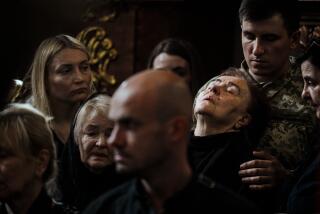Arbour Vows Day in Court for Kosovo
- Share via
CELINA, Yugoslavia — President Slobodan Milosevic tried to keep her out of Kosovo, but on Wednesday, war crimes prosecutor Louise Arbour surveyed by air and on the ground traces of the awful deeds that the Yugoslav leader’s forces are accused of committing against the province’s ethnic Albanians.
The evidence that Arbour is gathering could lead to additional charges against Milosevic, and new indictments of other suspected participants in the frenzy of mass murder, forced expulsion and other crimes committed in Kosovo up until last month. “There will be a telling of today’s story in a courtroom in The Hague,” vowed Arbour, a Canadian jurist who heads the International Criminal Tribunal for the Former Yugoslavia based in that Dutch city.
She made the pledge after gazing on the putrid ground where a day earlier forensic experts from Scotland Yard had exhumed the corpses of 21 people.
The victims--who included six children under 10 and seven teenagers--were shot at close range March 25 after they were discovered hiding in the bushes, surviving villagers have reported.
So far, 57 corpses have been exhumed in just this one village, with more graves still to be uncovered, said Bill Gent, a detective superintendent who is heading a British team gathering forensic evidence that he says would stand up in any court of law.
On Tuesday, at the start of her two-day visit to Kosovo to confer with the investigators who have been working in the province for the past five weeks, Arbour said that time is running out for Milosevic, who was indicted by her tribunal in May along with four of his associates.
“Mr. Milosevic thought he could keep me out of Kosovo,” she told reporters. “I believe he cannot keep himself out of The Hague.”
In addition to visiting Celina, Arbour made a helicopter and walking tour of some of the killing fields in Kosovo, including a newly discovered one that she declined to identify but which she said contained “overwhelming evidence of atrocities.”
She was given a hero’s welcome as her helicopter touched down next to a school that was destroyed by the Yugoslav onslaught against this village. About 500 people had gathered in the sun on a blazing day and waited patiently for hours for her arrival.
When Arbour emerged from the chopper, a diminutive figure surrounded by hulking bodyguards and NATO troops, a cheer went up, and schoolchildren rushed forward to press bouquets of flowers into her arms. “I never thought that she would be here,” said Selman Zeqiri, who lost his wife and two sons in the massacre along with 13 other relatives. Referring to the killers, he said, “Now they will have to go before the court.”
The tribunal has accused Milosevic and the other four of crimes against humanity and violations of the laws and customs of war, including the killing of 344 named victims and the forced deportation of ethnic Albanians.
But Arbour made clear Wednesday that these indictments were only the opening chapter for the tribunal. With forensic teams from the United States, Britain, Germany and other countries going to sites specified as a priority by the tribunal, more evidence is coming to light daily.
During her visit to Kosovo--a southern province of Yugoslavia’s chief republic, Serbia--Arbour was repeatedly asked if Milosevic and his subordinates will indeed ever have to face justice. “Every statement that we take, every grave that we uncover, every indictment that we bring, I think is an irreversible step,” she said in Celina. “I do not know when this is going to happen, but there is no doubt in my mind that it will happen.”
But she acknowledged that her investigators may never get to all the mass graves.
Meanwhile, NATO’s supreme commander for Europe, U.S. Gen. Wesley K. Clark, visited near the Kosovo town of Orahovac to try to reassure townspeople that the impending arrival of Russian peacekeeping troops will not threaten their safety.
Clark received a petition signed by nearly 20,000 people from the town--almost its entire population--asking that the Russians be kept out. For the seventh straight day, residents demonstrated against the Russians, who they say were supportive of the Serb-led Yugoslav army that ravaged their area of southern Kosovo.
In another sign of tensions in the province, the U.N. refugee agency said Wednesday that it is alarmed at increasing reports of attacks in Kosovo against the minority Serbian and Gypsy communities.
Meanwhile, moderate Kosovo Albanian leader Ibrahim Rugova is scheduled to make his political homecoming to Kosovo today, his first trip back since North Atlantic Treaty Organization troops entered the province June 12.
The pacifist Rugova led the nonviolent resistance on behalf of ethnic Albanians in the province for most of the last decade.
Rugova’s return may help answer the question of whether he has retained his political following or whether most ethnic Albanians now prefer the militant tactics of the guerrilla Kosovo Liberation Army, whose young leader, Hashim Thaci, is seen as the main rival to Rugova.
*
Times staff writer John J. Goldman at the United Nations contributed to this report.
More to Read
Sign up for Essential California
The most important California stories and recommendations in your inbox every morning.
You may occasionally receive promotional content from the Los Angeles Times.













